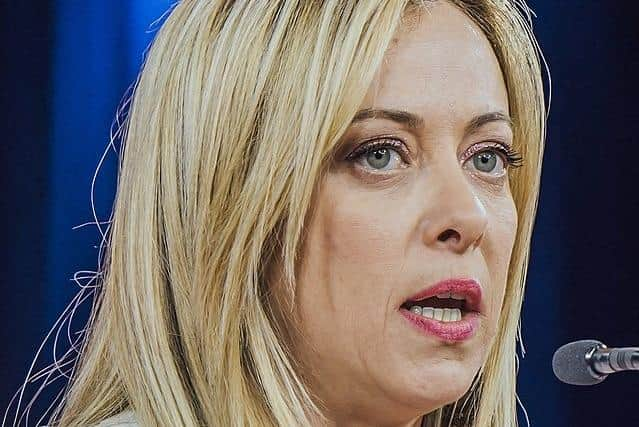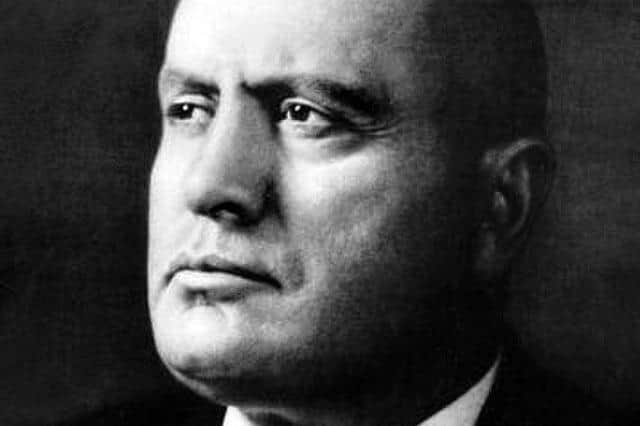What is Fascism? Italian election won by Giorgia Meloni, Italy’s reportedly far-right leader who denies fascist claims
Giorgia Meloni is the head of the right-wing FdI party who have the slogan “Italy and Italian people first!”
Meloni has called for lower taxes, a halt to immigration and reduced European bureaucracy. However, critics and international media have warned that her party is increasingly reminiscent of Italy’s fascist regime under Mussolini.
Advertisement
Hide AdAdvertisement
Hide AdWhile 45-year-old Meloni has rejected these claims, Italy is still experiencing upheaval in its politics as she is considered the first ‘far-right’ leader since World War II.


But what is fascism, what is the difference between right-wing and far-right politics, and is Meloni’s FdI party fascist as critics claim?
What is Fascism?
According to the Centre for Research on Extremism at the University of Oslo, fascism is “a form of revolutionary radical nationalism, usually labelled ‘ultra-nationalism’, which aims for a ‘rebirth’ of the nation.”
While the specific characteristics of fascism vary between scholars' definitions, it is generally accepted that the political ideology is characterised by authoritarianism and extreme nationalism.


Benito Mussolini, who founded and led the National Fascist Party and was Italy’s dictator between 1925 to 1943, coined the term ‘fascism’ in 1919.
The term comes from the Italian word “fascio” which refers to a group and is used to represent militant brotherhood.
The term “fasces” signifies an axe bound with sticks; this was used in ancient Rome as a symbol of the magistrate's power and it later became a symbol of the fascist movement in Italy, according to the History Department at King’s College.
What is the difference between right and far-right?
Giorgia Meloni has been called Italy’s “first far-right leader since World War II” by international media in reference to Benito Mussolini who led the country as a fascist dictator.
Advertisement
Hide AdAdvertisement
Hide AdHowever, other Italian leaders such as Silvio Berlusconi who founded the Forza Italia (“Go Italy!”) conservative party in 1994 and served as a Prime Minister until 2011 are also considered right-wing, so what is the difference between right and far-right?
According to Collins, the ‘right wing’ refers to a group or individual that has conservative or capitalist views, while the term ‘far-right wing’ refers to more “extreme, nationalistic viewpoints, including fascism or some oppressive ideologies.”
In a report by LiveScience, former Professor of Social Science at Columbia University Robert Paxton, said this far-right practice involves “anti-liberalism, rejecting individual rights, civil liberties, free enterprise and democracy.
“(Or) nationalism that seeks to expand the nation’s influence and power.”
Is Giorgia Meloni’s FdI a far-right party?
Whether or not Fratelli d’Italia is ‘far-right’ is debated between sources.
For many, ‘far right’ refers to overtly fascist or Nazi-style politics that are authoritarian or bigoted in nature.
However, in certain cases ‘far right’ may refer to parties that sit to the right of nations’ centre-right politics such as UKIP or the National Rally in France.
Cas Mudde, a Dutch politics professor, argues in his book ‘The Far Right Today’ that the group can be divided between the “extreme right” which rejects democracy and the “radical right” which accepts democracy yet opposes aspects of liberal democracy such as minority rights and the separation of powers.
Advertisement
Hide AdAdvertisement
Hide AdAccording to Italian newspaper The Local, in Italy the label ‘estrema destra’ (extreme right) is often reserved for neo-fascist groups like CasaPound and Forza Nuova, which overtly desire to revive Mussolini-era ideas.
For this reason, Meloni’s FdI party is also referred to as ‘centre-right’ in Italian news reports as by comparison they may be considered moderate.
However, the party fits this description of ‘radical right’, and has roots in the extreme right, making ‘far right’ seem an apt description.
Why are critics calling FdI a post-fascist party?
Giorgia Meloni’s FdI party being called neo or post-fascist is embedded in its history; the group is a political descendant of the Italian Social Movement (MSI) which was formed by Mussolini supporters after World War II.
Critics argue that this makes her political party post-fascist by its very definition.
The FdI logo still features a tricolour flame symbol that was formerly used by MSI and despite some members of the party arguing for its removal, Meloni defended its use for its historical significance while claiming that there is no place for fascist “nostalgia” in FdI.
In a video posted in August aimed towards the international press, Meloni said “fascism has been consigned to history.”
Meloni, however, has also been criticised for anti-LGBT sentiment with comments such as: “Yes to to the natural family. No to LGBT lobbies.”
Advertisement
Hide AdAdvertisement
Hide AdOther associated party members like its regional leader for Sicily, Calogero Pisano, were suspended after he published a series of Facebook posts praising Adolf Hitler, adding to the list of the party’s ongoing controversies.
Comments
Want to join the conversation? Please or to comment on this article.
